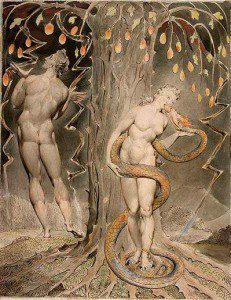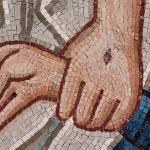Christianity Today’s Her.meneutics blog ran a post yesterday on women being “Cursed by Natural Childbirth.”
“Like my sister, Eve, I am under the Curse,” the author writes, referring to the biblical story in Genesis 3 in which Eve is “cursed” by God for having eaten the forbidden fruit of the tree of knowledge:
To the woman [God] said,
“I will greatly increase your pangs in childbearing;
in pain you shall bring forth children,
yet your desire shall be for your husband,
and he shall rule over you.”
The Her.meneutics writer embraces this curse as a kind of sacred duty, opting for natural child birth without any painkillers because, apparently, an epidural would constitute some kind of insubordinate attempt to escape the divine punishment that she — and all women — deserves to suffer. She eloquently describes “the inexhaustible pain that battered me” during the hours of labor, but comes to see this Curse as a blessing:
I, too, sensed the Lord’s pure sympathy. I sensed him saying, “I’m so sorry. I’m so sorry that, yes, you too are under the Curse in this life, my daughter. But this trial is over now. You went through it. I love you.” There was a real blessing in those moments. He was near.
Here’s where I need your help, because this seems to me to be a flagrant double-standard — the kind of double-standard that suggests something is horribly awry.

I’m not fond of the way this article treats the Genesis story of, as Milton wrote in Paradise Lost, “Mans First Disobedience, and the Fruit / Of that Forbidden Tree, whose mortal taste / Brought Death into the World, and all our woe / With loss of Eden …”
Milton’s next line — a reference to Paul’s argument in Romans — is “till one greater Man / Restore us.”
But there’s no hint of that restoration at work in CT’s discussion of being “under the Curse.” Jesus, in this discussion, is “so sorry” for such pain, but what can he do? Nothing. As much as he might prefer to have conquered sin and death, this Jesus seems powerless against them.
That seems like an astonishing implication from a Christian publication, but I suppose for the mostly Reformed-ish readership of CT, the idea that God is incapable of redeeming more than just a little slice of humanity doesn’t seem as scandalously weird as it does to me.
But set all that aside. What bugs me here is the devotional embrace — almost the fetishization — of the belief that ladyparts are and deserve to be cursed by God. This isn’t unique to this one writer or this one article. It’s something that you can find throughout white evangelical Christianity in America.
The idea, again, is based on an interpretation of that story in Genesis 3. But that interpretation is not consistently applied. And this inconsistency, it seems to me, suggests that this interpretation is not being honestly implied. It seems to be a double-standard — a duplicitous standard.
Because the following verses in Genesis 3 say this:
And to the man [God] said,
“Because you have listened to the voice of your wife,
and have eaten of the tree
about which I commanded you,
‘You shall not eat of it,’
cursed is the ground because of you;
in toil you shall eat of it all the days of your life;
thorns and thistles it shall bring forth for you;
and you shall eat the plants of the field.
By the sweat of your face
you shall eat bread
until you return to the ground,
for out of it you were taken;
you are dust,
and to dust you shall return.”
Yet the very same people who insist that “in pain you shall bring forth children” is a sacred duty and a holy obligation for women never, ever suggest the same thing about the toil and sweat of men.
A woman who evades the “Curse” of painful childbirth through the false gods of medical technology is viewed with suspicion. She is portrayed as irreverent, somehow, for failing to embrace her punishment. But what of the millions of men — white-collar executives, investors, the idle rich, and the uncalloused managerial class who eat their bread without ever being subject to sweat and toil? No such suspicion attaches to them.
Men are congratulated for avoiding the pain, toil and sweat of their “Curse.” They are, within the church, celebrated as particularly and deservedly blessed by God.
Is there some principled explanation for this double standard? Is there some unspoken variable that would account for these two opposite interpretations of this one story? Is there something I’m missing here — something that could explain this as anything other than the simplest explanation for what appears to be happening here?
Because the simplest explanation is that this is simply crude dishonesty in service of cruel misogyny.
And unless someone provides some other plausible explanation, that’s what I’ll have to conclude is going on here.
















